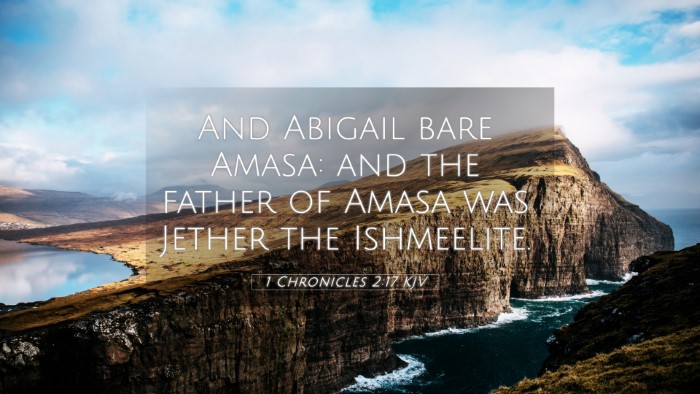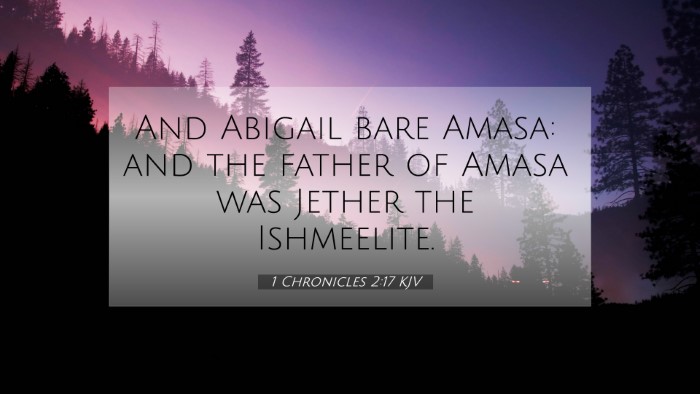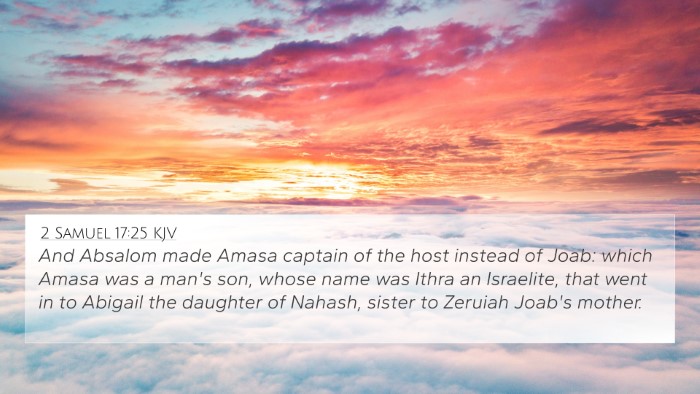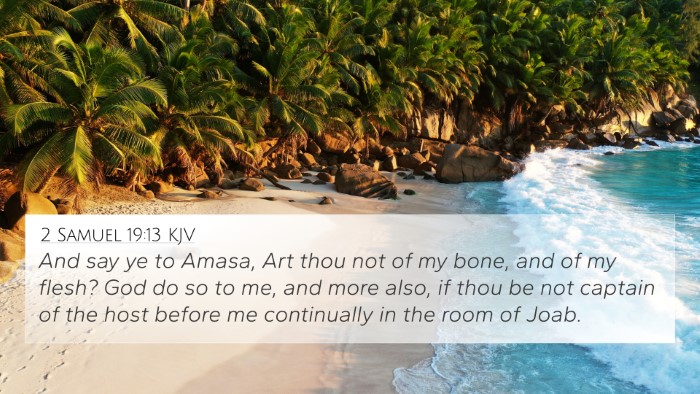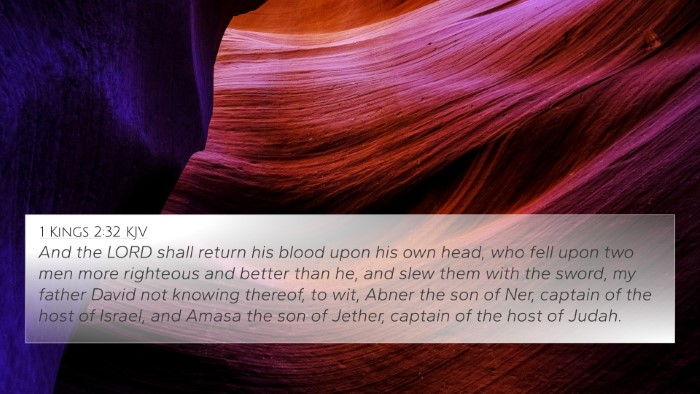Understanding 1 Chronicles 2:17
Verse Reference: 1 Chronicles 2:17 - "And Abigal bare Amasa: and the father of Amasa was Jether the Ishmeelite."
Contextual Overview
The genealogy presented in 1 Chronicles is crucial for understanding the lineage of the tribes of Israel, particularly the tribe of Judah from which King David descends. This verse highlights the familial connections, drawing attention to the individuals involved in this lineage.
Verse Meaning
The mention of Abigal and her son Amasa serves to illustrate the continuity and complexity of David's ancestry. Jether, described as an Ishmeelite, reflects the blending of different tribes and clans, which is a consistent theme throughout the genealogies in Chronicles.
Commentary Insights
- Matthew Henry: Henry emphasizes the significance of family ties in understanding Israel's history. He notes the importance of Amasa as a notable figure in David's later reign, highlighting the way familial relationships shaped leadership.
- Albert Barnes: Barnes comments on the implications of intermarriage between the Israelites and other groups, suggesting a broader understanding of God's people. He underscores how Amasa's lineage connects to significant events in David's life.
- Adam Clarke: Clarke elaborates on Amasa's role as a captain during Absalom's rebellion, connecting the past to the future, and noting how these genealogical records serve as a bridge between historical and theological narratives.
Bible Cross-References
This verse connects with multiple references throughout the Bible, illustrating the wider thematic elements of genealogy, leadership, and God's plan for Israel. Below are key verses that relate:
- 2 Samuel 17:25: References Amasa's role and identity as an important figure during Absalom's rebellion.
- 1 Chronicles 3:1-2: Details David's sons, showing the significance of lineage and descent.
- Matthew 1:12-16: Matthew’s genealogy that connects Joseph back to David, emphasizing the fulfillment of promises through lineage.
- Jeremiah 33:17: Speaks about the assurance that David will always have a descendant to reign on his throne.
- Hebrews 7:14: Indicates Jesus' lineage through Judah, tying the Old Testament genealogies to New Testament teachings.
- Luke 3:23-38: Offers another genealogy of Jesus, illustrating the theological significance of genealogy.
- Ruth 4:18-22: Highlights the lineage of David through Boaz and Ruth, showcasing the importance of past connections.
Thematic Connections
1 Chronicles 2:17 thus becomes a vital link in understanding the continuity of Israel's history from the Old Testament to the New Testament. The verse opens avenues for exploring deeper themes of:
- God’s Sovereignty: How God orchestrates family lines for His divine purposes.
- Leadership and Legacy: The impact of familial lineage on leadership in Israel.
- The Importance of Community: Highlighting inter-tribal connections that contribute to a united Israel.
Using Cross-References for Study
Engaging with cross-references like those found in 1 Chronicles 2:17 enhances the understanding of scripture. Here are some tools and methods to assist in cross-referencing:
- Bible Concordance: Use a concordance to find synonymous terms and related scriptures.
- Bible Cross-Reference Guide: Many study Bibles offer built-in cross-reference systems to guide connections.
- Bible Chain References: Following thematic chains from one verse to another provides insight into biblical narratives.
- Comparative Studies: Analyze the connections between the Old and New Testament genealogies and themes.
- Identifying Themes: Look for common messages or lessons found in different verses that relate to familial connections.
Conclusion
1 Chronicles 2:17 serves as more than a mere genealogical statement; it opens a dialogue about the intricacies of God’s plan through the lineage of David. By using various cross-references and engaging with commentaries, readers can deepen their understanding of this and related scriptures, enriching their biblical study experience.

